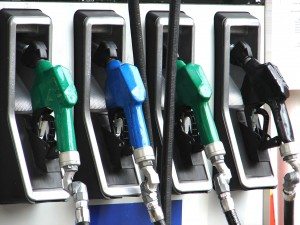If you’ve ever filled your car up at a gas station, you probably at some point have wondered what’s with the different types of gas available. Some are more expensive than others, due to variations in refining and state taxes; some are rated with different numbers; but they all seemingly work with your car. You’ve probably assumed that the more expensive ones are better in some regard, but you may have no idea as to how or why they are better. So what’s the deal?
The most basic difference between gas types is their octane ratings. This is indicated by the number you see next to the different levels of gas, and it is also the primary factor in the different prices of gasoline. The octane level is a measure of performance in gasoline that indicates how much compression the fuel can withstand before igniting. The higher the number, the more compression it can withstand. Diesel engines, which compress air rather than fuel, usually are fine with lower octane ratings. However, petrol engines, which are far more common in consumer vehicles, often times require fuel with a higher octane rating. Regular gasoline usually has an octane rating of 87, mid-grade at 89, and premium usually somewhere from 91-93.
It may be tempting to think that premium gas is simply “better,” and while this is true to an extent, it’s not quite as simple as it seems. The best way to know what gas to use in your car is to check your owner’s manual. Most engines will recommend regular gasoline, but some high performance engines will utilize higher compression and therefore require gasoline with higher octane levels. Whether you’re driving a brand new Ford for a used car that’s seen better days, it’s always a good idea to adhere strictly to the engine’s octane recommendation.
It’s important to note that you typically won’t get much added benefit by using a higher octane rating than recommended, but you can run into problems if you use a lower rating than recommended. If you lose the incorrect grade of gasoline, you may experience engine knocking, during which the air/fuel combination doesn’t combust at the optimum point in the cycle. This is a sure indication that you need to get a higher octane fuel.
Although understanding octane ratings is important, making sure you get the best car service is crucial to keep your engine running great.
Lamarque Ford is proud to be one of the premier dealerships in New Orleans, LA. Located in Kenner, LA, Lamarque Ford is committed to providing you the best customer service and vehicle service for the life of your vehicle. Whether you’re on the market to purchase, finance, or service a new or used Ford vehicle, you’ve come to the right place.


